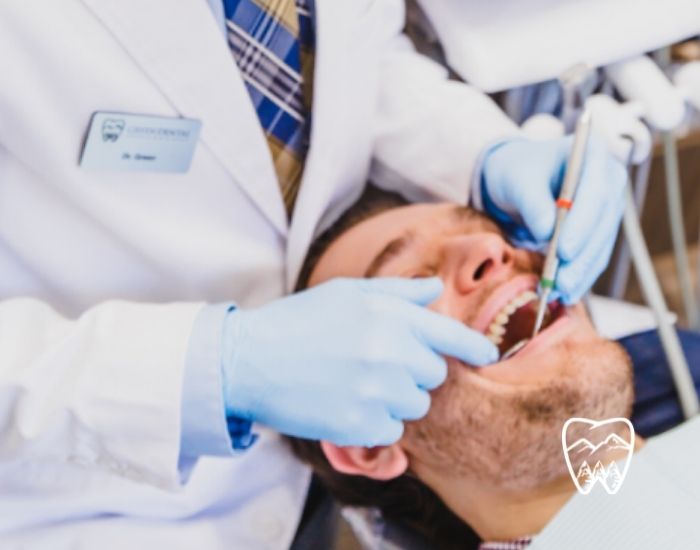Signs You May Have Tooth Decay

What Are Some Signs You May Have Tooth Decay?
Your dental health is critical to your overall wellness. One of the essential strategies to maintain your teeth in excellent condition and avoid additional difficulties is to prevent tooth decay or cavities.
According to the Centers for Disease Control and Prevention, about 30% of American adults have untreated dental cavities. Cavities that go untreated can ruin your teeth and lead to more serious problems. That’s why it’s essential to recognize the symptoms of a tooth cavity and to visit your Parker CO dentist as soon as possible if you suspect you have one.
How Do Dental Cavities Form?
Plaque may form when food and germs accumulate in your teeth. Plaque bacteria create acids that have the potential to damage the enamel on the surface of your teeth. Brushing and flossing your teeth regularly can help remove the sticky plaque. However, if plaque is allowed to accumulate, it can eat away at your teeth and cause cavities.
A cavity is a hole that develops in your tooth. A cavity, if left untreated, can eventually damage your teeth to the point of infection. Untreated cavities can also lead to more serious consequences, such as a tooth abscess or an infection that spreads to your bloodstream, which can be fatal.
Plaque is more likely to form in the following areas of your mouth:
- Chewing surfaces of your molars, where food particles can accumulate in the grooves and crevices
- Between your teeth,
- The bottom of your teeth near your gums
Eating foods that stick to your teeth regularly may also raise your chance of developing a cavity. Examples of these foods are
- ice cream
- dried fruits
- soda
- hard candy
- chips
- fruit juice
- sweet meals such as cake, cookies, and gummy candies
Although children are more likely to develop cavities, adults are always in danger, especially when gums recede away from the teeth, exposing the roots to plaque.
Indications Of A Cavity
Various symptoms may suggest the onset of a cavity. There are also other red signals that an existing cavity grows in size. Here are some of the most typical symptoms of a cavity.
Sensitivity To Heat and Cold
Sensitivity that persists after consuming hot or cold foods might indicate the presence of a cavity. In addition, when the enamel on your tooth begins to wear away, the dentin, the hard tissue layer beneath the enamel, might be affected. Dentin is made up of thousands of small hollow tubes.
Foods that are hot, cold, sticky, or acidic might excite the cells and nerves inside your tooth when there isn’t enough enamel to protect the dentin. This is what causes your sensitivity.
Persistent Sweet Sensitivity
As talked about by our friends at Kissing Camel Family Dentistry dentist in Colorado Springs CO says that heat and cold are the most prevalent sensitivities associated with tooth decay, I believe residual sensitivity to sweets and sugary drinks can also indicate dental disease. A persistent ache from sweets, like temperature sensitivity, is typically the consequence of enamel damage and, more precisely, the beginning of a cavity.
Tooth Pain
A persistent aching in one or more of your teeth may suggest the presence of a cavity. One of the most frequent signs of a cavity is discomfort.
This soreness might occur unexpectedly or as a result of anything you eat. This involves soreness and pain in or around your mouth. You may also experience discomfort and pressure when you bite down on food.
Tooth Staining
White patches on your teeth may be the first sign of a stain. The stain may get darker as the tooth decay progresses. Cavity staining can be brown, black, or white, and it usually develops on the tooth’s surface.
A Tooth With A Hole or Pit In It
If the white spot on your tooth (which indicates the beginning of a cavity) worsens, you will have a hole or pit in your tooth, which you may be able to see in the mirror or feel when you run your tongue over the surface of your teeth.
Some holes, particularly those between your teeth or in crevices, are not visible or feelable. However, you may still have discomfort or sensitivity in the cavity area.
Make an appointment with your dentist in Parker CO if you see a hole or pit in your tooth. This is an obvious indication of tooth decay.
Contact Green Dental Care Today
If you feel the need to contact a dentist near you our team of experts is here to assist you in any way possible. Give us a call today to schedule an appointment today to see if we can get to the root of the problem you may have.

